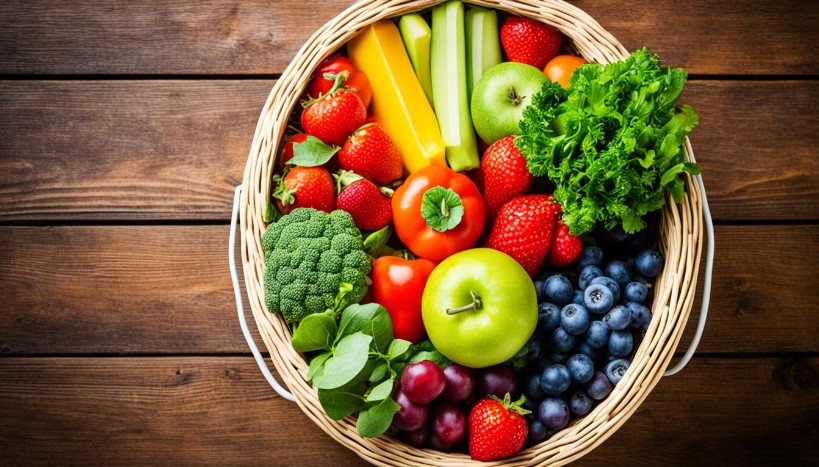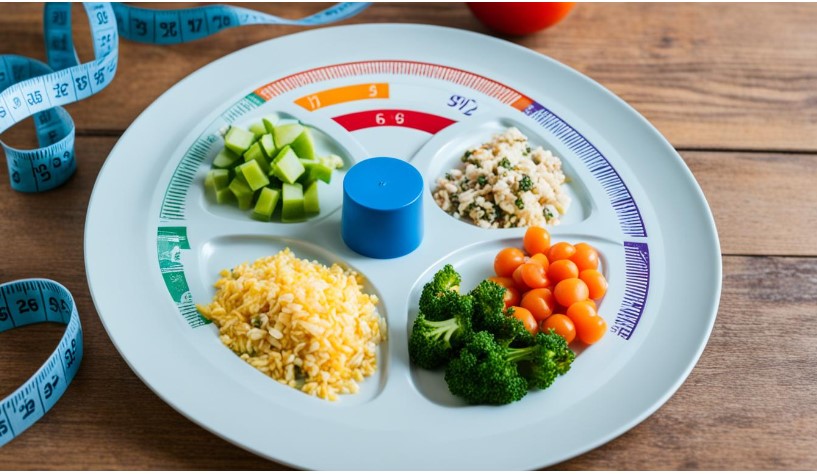Striving for a healthy weight is more than just about appearance; it’s about enhancing your well-being and lowering health risks. The cornerstone of successful weight management is a balanced, nutritious diet, alongside consistent physical activity. This guide delves into the core of healthy eating, offering practical advice for tailoring a diet plan that suits you. It also addresses common hurdles you might face on your path to better health.

Key Takeaways
- Understand the importance of macronutrients (proteins, carbohydrates, and fats) and micronutrients (vitamins and minerals) for a balanced diet.
- Learn strategies for creating a personalized, nutrient-dense meal plan to support your weight management goals.
- Discover the benefits of portion control and mindful eating habits for sustainable weight loss.
- Explore healthy cooking techniques to make delicious and nutritious meals at home.
- Recognize the role of regular physical activity in maintaining a healthy weight and overall well-being.
Understanding the Fundamentals of Nutrition
Starting on the path to a healthy weight and well-being requires grasping the core of nutrition. We’ll explore the vital macronutrients and micronutrients that power our bodies. These elements are key to a balanced diet plan.
Macronutrients: Proteins, Carbohydrates, and Fats
Macronutrients are the main energy sources for our bodies. They consist of proteins, carbohydrates, and fats, each vital for different bodily functions.
- Proteins are crucial for cell repair, muscle growth, and maintenance.
- Carbohydrates fuel our muscles and brain, coming in simple sugars, starches, and fiber forms.
- Fats are vital for hormone production, nutrient absorption, and protecting vital organs, and they keep our skin and hair healthy.
Micronutrients: Vitamins, Minerals, and Their Importance
Micronutrients, like vitamins and minerals, are equally vital for our health. They support various bodily functions, from immune health to bone strength.
| Micronutrient | Key Benefits |
|---|---|
| Vitamins A, C, and E | Promote healthy skin, vision, and immune system |
| Calcium and Vitamin D | Support strong bones and teeth |
| Iron and B Vitamins | Help prevent anemia and support energy levels |
Understanding the roles of macronutrients and micronutrients helps you make better nutrition advice, balanced diet plans, and nutritious food choices. These choices are essential for your overall health and well-being.
Crafting a Balanced and Nutritious Diet Plan
Creating a diet plan that aids in healthy weight management and overall wellness is crucial. Focus on a mix of nutritious food choices, calorie-conscious meals, and following dietary guidelines. This approach helps in crafting a balanced diet plan that feeds your body and supports a healthy lifestyle.
Begin by making sure your diet includes a variety of nutrient-dense foods from key food groups. These include fruits, vegetables, whole grains, lean proteins, and healthy fats. Aim for a plate full of colors to ensure a broad spectrum of vitamins, minerals, and antioxidants.
Be mindful of portion sizes and adopt a calorie-aware mindset for a calorie-conscious diet. Use dietary guidelines and recommended serving sizes to guide your choices. This helps in maintaining a balanced diet plan.
- Incorporate a variety of nutritious food choices from all the major food groups
- Practice calorie awareness and pay attention to portion sizes
- Refer to dietary guidelines to ensure your balanced diet plan is well-rounded

A balanced diet plan is not about cutting out foods or feeling deprived. It’s about finding a sustainable way to feed your body and support your health and well-being. By making thoughtful nutritious food choices and controlling calorie-conscious portions, you can enjoy a balanced and nutritious diet plan. This diet plan helps you meet your health and wellness objectives.
Portion Control: The Key to Sustainable Weight Management
Mastering portion control is crucial for achieving and maintaining a healthy weight. This strategy involves being mindful of the food you eat. By controlling the amount you consume, you can ensure a balanced diet without overeating. It’s a simple yet effective way to manage your weight.
Mindful Eating and Listening to Hunger Cues
Mindful eating is essential for effective portion control. It involves slowing down, savoring each bite, and listening to your body’s hunger and fullness signals. This method helps you distinguish between true hunger and emotional eating. It also enhances your enjoyment of meals and prevents overeating.
- Pay attention to hunger and fullness cues, such as a growling stomach or a feeling of content, to guide your portion sizes.
- Eat slowly and mindfully, putting down your utensils between bites to promote better awareness and satisfaction.
- Use smaller plates and bowls to create the perception of a larger portion, which can help you feel more satisfied with less food.
- Avoid distractions like TV, smartphones, or laptops while eating, as they can lead to mindless overeating.
By adopting these weight management strategies, you can enjoy calorie-conscious meals that support your health and wellness. Portion control and mindful eating are key to a sustainable, healthy weight.

Healthy Cooking Techniques for Delicious and Nutritious Meals
Preparing meals that are both nutritious and flavorful doesn’t have to be overwhelming. By exploring various healthy cooking techniques, you can create meals that are both delicious and support your health. Let’s explore some top strategies to improve your clean eating habits.
Steaming is a fundamental method in healthy cooking. It preserves the natural flavors and nutrients of ingredients, making it perfect for cooking vegetables, fish, and lean proteins. This technique allows you to enjoy your ingredients’ true essence without the need for extra fats or oils.
Roasting is another versatile technique. By seasoning your veggies, fruits, or lean meats with a bit of healthy oil and spices, you can achieve a delicious caramelized exterior and a tender, juicy interior. Roasting enhances the natural sweetness and intensifies the flavors of your food.
For those looking for quick and easy meal prep, sautéing in a non-stick pan with a small amount of broth or wine can be transformative. This method cooks your ingredients quickly while preserving their texture and nutrients.
Lastly, consider the benefits of slow cooking or Instant Pot recipes. These methods make tough cuts of meat tender and turn simple ingredients into hearty, comforting dishes without losing their nutritional value.

By adding these healthy cooking techniques to your skills, you can enjoy meals that are both tasty and support your health. Embrace the art of clean eating and discover a world of delicious, nutritious dishes in your kitchen.
Tips for Healthy Eating, Healthy Weight, Best Diets for Healthy, Healthy Eating
Keeping a healthy weight and making nutritious eating a part of your life is vital for your well-being. Whether you aim for weight management or just want to live healthier, these tips can guide you. They offer practical advice to help you meet your health goals.
Understanding the value of a balanced diet is crucial for healthy eating. Choose a mix of lean proteins, whole grains, fresh fruits, and vegetables. This approach ensures your body gets the necessary vitamins, minerals, and nutrients for optimal functioning.
For managing weight, controlling portions is key. Pay attention to how much you eat and avoid overeating, even with healthy foods. Eat slowly, enjoy each bite, and tune into your body’s signals of hunger and fullness.
| Healthy Eating Tips | Weight Management Strategies | Best Diets for Healthy Eating |
|---|---|---|
| Eat a variety of nutrient-dense foodsFocus on whole, unprocessed foodsIncorporate more fruits and vegetables | Practice portion controlUnderstand and listen to hunger cuesEngage in regular physical activity | Mediterranean DietDASH DietFlexitarian Diet |
By adopting these tips and exploring top diets for healthy eating, you can start a path to a healthier weight and a balanced lifestyle. Remember, small, steady changes can lead to lasting success and better health.
The Importance of Regular Physical Activity
Managing your weight effectively goes beyond just what you eat. It’s equally important to stay active daily. Exercise is vital for your health and well-being, offering numerous benefits for weight management.
Incorporating Exercise into Your Daily Routine
Adding physical activity to your life can be done in various ways. Here are some tips to kickstart your journey:
- Aim for at least 150 minutes of moderate-intensity aerobic activity, such as brisk walking or cycling, per week.
- Incorporate strength training exercises, such as bodyweight exercises or weightlifting, at least two days per week to build and maintain muscle mass.
- Break up your exercise routine into smaller, manageable segments throughout the day to make it more achievable.
- Find activities you genuinely enjoy, whether it’s dancing, swimming, or hiking, to make exercise a positive part of your lifestyle.
- Enlist the support of friends or family members to make physical activity a social and enjoyable experience.
By setting a consistent exercise routine, you support your weight management strategies and boost your physical and mental health. Start small and gradually increase your physical activity to create a lasting exercise routine.
Overcoming Barriers to Healthy Eating
Many individuals find it challenging to maintain a healthy diet due to various obstacles. However, with strategic planning and a positive mindset, these hurdles can be surmounted. This opens the door to a healthier and more sustainable lifestyle.
Time is a significant barrier for many, given our fast-paced lives. People often find it difficult to allocate time for meal planning, preparation, and cooking. To overcome this, prioritizing meal preparation and exploring time-saving techniques is crucial. This includes meal prepping or using quick, healthy recipes.
Another major obstacle is the perceived high cost of healthy foods. Yet, many nutritious ingredients are actually affordable. By focusing on seasonal produce, bulk purchases, and plant-based proteins, individuals on a budget can still eat healthily.
- Plan and prepare meals in advance to save time
- Explore budget-friendly healthy ingredients and recipes
- Seek support from family, friends, or online communities
- Identify and address emotional or psychological barriers
- Gradually incorporate healthier habits into your routine
Emotional and psychological barriers, such as stress, cravings, or lack of motivation, also pose challenges. Seeking support from loved ones, friends, or online forums can be beneficial. Addressing the underlying causes of these barriers can also aid in overcoming them.
Remember, changing your eating habits for the long term is a journey, not a quick fix. By gradually adding healthier habits and celebrating small successes, you can effectively navigate the barriers to healthy eating. This approach will help you achieve your weight management goals.
The Role of Hydration and Adequate Water Intake
Proper hydration is essential for tips for healthy eating and managing weight effectively. The importance of hydration is immense, as water is crucial for many bodily functions. It supports the body in numerous ways.
Water constitutes about 60% of our body weight. It’s vital for regulating body temperature, transporting nutrients, and aiding organ function. Drinking enough water can also help control hunger, increase metabolism, and reduce fluid retention. These benefits are key for weight management.
Experts suggest drinking at least eight 8-ounce glasses of water daily, which equals about 2 liters. But, individual needs can change based on activity level, climate, and health status. It’s crucial to pay attention to your body’s thirst signals and adjust your water intake as needed.
- Carry a reusable water bottle with you throughout the day to encourage consistent hydration.
- Eat water-rich foods like fruits and vegetables to boost your overall fluid intake.
- Avoid sugary beverages and opt for water, unsweetened tea, or infused water instead.
By focusing on hydration and ensuring you drink enough water, you support your healthy eating and weight management efforts. This leads to better physical and mental health.
| Benefits of Proper Hydration | Consequences of Dehydration |
|---|---|
| Regulates body temperature | Fatigue and dizziness |
| Supports nutrient transportation | Headaches and confusion |
| Promotes organ function | Muscle cramps and joint pain |
| Aids in weight management | Constipation and kidney issues |
Read More Fruits and Food Blogs
Conclusion
As we conclude this journey through the principles of healthy eating and weight management, it’s crucial to understand that lasting success comes from a holistic approach. The tips for healthy eating, grasping healthy weight concepts, and exploring the best diets for healthy lifestyles form a strong base for your wellness path.
By adopting key healthy eating habits, like focusing on nutrient-rich whole foods, managing portions, and staying active, you pave the way to a healthier life. Remember, it’s the consistent, small steps that lead to lasting change. Don’t let setbacks deter you; view them as chances to learn and adapt.
Your health and well-being are entirely in your control. Use the insights you’ve learned, try out the strategies that feel right, and believe in your capacity to make beneficial changes. With dedication to the principles shared here, you can create a future of healthy weight and the energy to live life to the fullest.
FAQ
What are the key principles of healthy eating for weight management?
Key principles include focusing on nutrient-dense foods and maintaining portion control. Staying hydrated and incorporating regular physical activity are also crucial. A diet rich in whole, minimally processed foods aids in achieving and maintaining a healthy weight.
What are the essential macronutrients and micronutrients for a balanced diet?
Essential macronutrients are proteins, carbohydrates, and fats, vital for energy and bodily functions. Micronutrients, like vitamins and minerals, are vital for health and well-being. A diverse diet rich in nutrient-dense foods ensures you meet your wellness goals.
How can I create a balanced and nutritious diet plan for healthy weight management?
Include a variety of whole, minimally processed foods like fruits, vegetables, lean proteins, whole grains, and healthy fats in your diet. Be mindful of portion sizes and calorie intake to meet your individual needs for a balanced diet.
Why is portion control important for sustainable weight management?
Portion control is vital for sustainable weight management by maintaining a calorie balance. It helps you avoid overconsumption and supports long-term healthy weight maintenance by listening to your hunger and fullness cues.
What are some healthy cooking techniques for delicious and nutritious meals?
Healthy cooking techniques include grilling, baking, steaming, and sautéing with minimal oils or fats. These methods prepare flavorful, nutrient-dense meals without sacrificing nutritional value. Experiment with spices, herbs, and healthy substitutions to enhance your dishes.
What are some practical tips for incorporating healthy eating habits into my lifestyle?
Practical tips include planning meals in advance, reading nutrition labels, and staying hydrated. Gradually introducing healthier food choices and portion control can help build sustainable habits over time.
How important is regular physical activity for healthy weight management?
Regular physical activity is key for healthy weight management. Exercise helps burn calories, build muscle, and supports overall health. Enjoyable physical activities can make your healthy eating efforts more effective.
How can I overcome common barriers to healthy eating?
Overcome barriers by meal prepping, finding affordable nutrient-dense options, and gradually introducing new healthy foods. Seek support from friends, family, or healthcare professionals to help navigate these challenges.
Why is adequate hydration important for healthy eating and weight management?
Adequate hydration is crucial for healthy eating and weight management. It helps you feel full, regulates appetite, and supports bodily functions. Staying hydrated is a simple yet effective strategy for maintaining a healthy weight and well-being.


2 thoughts on “Tips for Healthy Eating for a Healthy Weight”